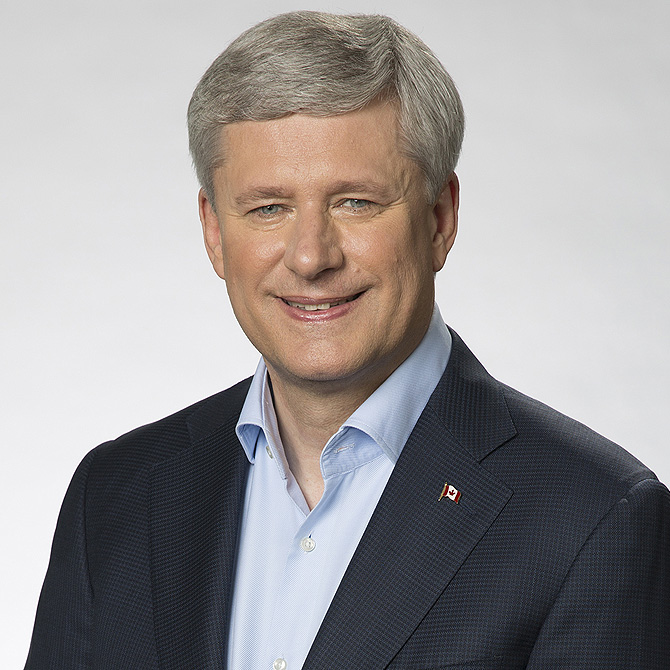Leadership on display as former PM Harper visits Israel
February 21, 2024
Sun political columnist Brian Lilley talks about the leadership shown by former Prime Minister Stephen Harper during a visit to Israel.

WWSG Exclusive
Chairman and CEO, Harper & Associates; 22nd Prime Minister of Canada (2006-2015)
The Right Honourable Stephen Harper led Canada through the world’s most complex geopolitical, economic, and security challenges as the country’s 22nd Prime Minister. During his tenure in the world’s top forums such as the G-7 and G-20, NATO, and the United Nations, Prime Minister Harper was known for a frank, assertive leadership style defined by principled diplomacy, disciplined economic policy, a strong stance on international peace and security, and passionate defense of freedom and human dignity.
The world faces a daunting set of challenges to traditional pillars of political, economic and global security. Ungoverned spaces pose risks and defy intervention. Social media and modern communications technologies mobilize “the street”, but are then hijacked by anti-democratic forces. Western leaders face an expansionist Russia, an assertive China, the ongoing threat of terror and cybercrime, and populist challenges to trade and migration. In this enormously complex issue environment, what lessons must we learn from recent years, and how should policy responses evolve if we are to bolster global stability and avoid further risks to our economy and way of life?
Prime Minister Harper provides the unique perspective of a trained economist who spent ten years leading a G-7 government confronting the geopolitical realities and challenges of our time. Known for his thoughtful and frank analysis, Harper shares his insights on how the democratic world can re-establish leadership, tackle challenges to international peace and security, engage wary citizens tested by the realities of globalization, and confront the challenges to global order that threaten our economic future.
From his seat at the G-20 and G-7 tables, Prime Minister Harper dealt first hand with the global economic crisis in 2008. His government oversaw the delivery of rapid economic stimulus in coordination with the US and other G-20 partners. Simultaneously, Harper consistently warned of the stimulus trap; spiraling spending, structural deficits and the eventual and inevitable need for painful austerity. As Prime Minister, Harper delivered targeted, time limited stimulus and returned his country’s finances to balance on schedule. Canada came out of the 2008-09 global recession faster and stronger than any other developed country and has added more than a million full-time jobs since then.
Now, with ongoing global economic uncertainty and low growth for the foreseeable future, governments are once again turning to expansionary fiscal policy, though with insufficient regard for the consequences. How can governments and business leaders foster an economic environment that creates jobs and growth without succumbing to the stimulus trap? As a trained economist, and as a leader with first-hand experience dealing with the global recession, Prime Minister Harper draws on his unique experience in articulating how we can navigate the most pressing economic issues of our time without forsaking long-term economic sustainability.
During the course of his nearly ten years leading a G-7 economy, Prime Minister Harper worked to increase growth by aggressively expanding Canada’s free trade opportunities. With only 5 deals in 2006, by 2015 Harper’s government had concluded agreements with 46 countries, including the Canada-EU Free Trade Agreement, securing Canada’s place within the Trans-Pacific-Partnership, and a range of bilateral agreements. But politics and rising protectionism increasingly threaten the conclusion of ambitious trade deals. Both Presidential candidates in the U.S. have stated their opposition to the TPP and even NAFTA, and Brexit raises new questions about securing barrier-free access to European markets. Not only are major multilateral negotiations stalled but advanced economies must also grapple with how to structure trading relationships, supply chains and labor pools with emerging economies and non-free market economies, such as China.
In a global economy dependent on highly integrated supply chains, only countries and businesses that understand and successfully navigate these challenges will be positioned for success. Many leaders talk about growing trade, but Prime Minister Harper brings the insight of a leader who personally negotiated trade deals to conclusion. This experience, combined with his broad insight into the geopolitical pressures that are shaping the global economy, allows Prime Minister Harper to offer a unique perspective to business leaders and policy makers on the future of global trading relationships.
Under Prime Minister Harper’s leadership Canada punched above its weight on foreign policy. His approach was marked by clarity, insight, and a willingness to act in concert with allies to protect the interests of the free world.
Some of Harper’s notable successes include:
A vocal defender of freedom and human dignity, Prime Minister Harper speaks with the clarity of a seasoned statesman on the international stage at a time of rising concern over waning western leadership. Drawing on years of personal experience at the tables of power, Prime Minister Harper offers his assessment of what the West is getting right, what we are getting wrong, and how business and policy leaders can best secure a path forward in a dangerous multi-polar world marked by conflicting value systems and geopolitical risk.
For nearly a decade The Right Honourable Stephen J. Harper led Canada through the world’s most complex geopolitical, economic and security challenges as the country’s 22nd Prime Minister. He created the modern Conservative Party of Canada, won three successive national elections, and was the longest serving Conservative Prime Minister since Canada’s founding Prime Minister in 1891.
Since leaving office in 2016, Mr. Harper founded and is Chairman and CEO of Harper & Associates, a global consulting and investment advisory business, and is Chairman of Vision One. He serves as a Director of Colliers International Group Inc. and Recover Inc. He is also the recent author of “Right Here, Right Now: Politics and Leadership in the Age of Disruption”, and a frequent speaker on geopolitical trends, populism, and business.
Mr. Harper serves as Chairman of the International Democrat Union, the Friends of Israel Initiative, and India’s Observer Research Foundation. He has bachelor’s and master’s degrees in economics from the University of Calgary, an honorary doctorate from Tel Aviv University and an honorary degree from the Jerusalem College of Technology. He is a Companion of the Order of Canada and the recipient of numerous international recognitions, including the Order of Liberty, Ukraine’s highest civilian honour.
Mr. Harper resides in Alberta, Canada with his wife Laureen; they have two adult children, Benjamin and Rachel.
Easily the most personable, enjoyable and sincere special guest we have had in our 15 years of doing this event.
Angela Verardi, Director of Events at UJA Federation of Greater Toronto
The PM was a great addition to the program. We heard throughout the event from both staff and clients that his content was engaging, and attendees were very happy with it. His keynote was instrumental in making the program the success that it was!
Litsa Kokinias, Senior Meeting and Event Planner at Franklin Templeton

